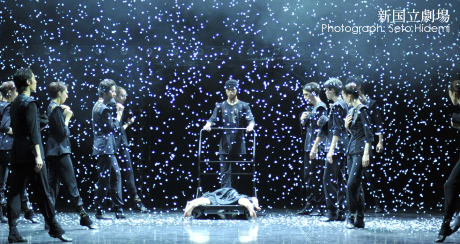Eifman's Anna Karenina
- 2011/2012 Season
- PLAYHOUSE
Their performance of Boris Eifman's Anna Karenina stands out as crowning achievement for the National Ballet of Japan. The first production here in 2010 met with widespread acclaim from critics in Japan and overseas.
Eifman's ballets are some of the finest in the canon of modern Russian ballet. Each is marked by a high degree of difficulty and demands exacting technique and expressiveness from the dancers, plus a consummate understanding of their individual roles. In their performance of Anna Karenina in 2010, the dancers of the National Ballet of Japan proved themselves to be well up to the challenge, and they performed to ovations in full houses. In particular, audiences were deeply moved by the emotional expressiveness of the three dancers in the lead role, the male dancers, and the group dances. At the same time, the production was a rejuvenating experience for the company, and showed that the National Ballet of Japan was really coming into its own.
Even before this production, the ballerinas of the National Ballet of Japan were known for their subtlety of expression. With their performance of Eifman's Anna Karenina, the company revealed a new individuality onstage for the first time. David Bintley was also quite pleased with the results, and the decision was made to restage the ballet. The dancers have since continued to hone their technique and expression through their performance in other productions, and audiences can expect this revival of Anna Karenina to be an experience even more rewarding than the first.
SYNOPSIS
Act 1
Anna savored a satisfaction that was similar to sexual pleasure just by being near her son or when holding him, and every time he looked at her with his innocent, trusting and affection-filled eyes, she experienced a psychological calm.
When Anna saw him (Vronsky) for just a moment, something flickered in his eyes. It was in this instant that he felt an indescribable feeling of extreme happiness.
Vronsky was convinced that there was no other meaning to life than to be with her, to hear her voice.
Karenin felt that he had come up against something that was illogical and incomprehensible. Not knowing what to do, he was left bewildered. He was forced to face 'life' and the fact that his wife might be in love with another person.
"I need nothing more than this happiness. The more I know her the more I grow madly in love with her." (Vronsky)
Even though inwardly he was going mad with raging desire, outwardly Vronsky showed no change, continuing to move forward along the conventional familiar path of his interests and personal relationships with his regiment and high society.
"I understood clearly. I could not demonize myself any more than I already had. I'm just human; made of flesh and blood. I've committed no crime. God created me as a woman who would spend her life loving someone. My husband knows that I have not abandoned my son. And even if there is someone else I love, he knows that I cannot live my life without my son." (Anna)
Act 2
Vronsky felt that there was nothing he could do to save her and at the same time realized that he was the cause of her unhappiness.
"I am quite sure that I had asked you to behave yourself when among others so that people do not spread gossip about you and point fingers behind your back." (Karenin)
When Anna first tasted freedom, she was filled with an almost embarrassing amount of happiness and joy that radiated from her entire being. Bankruptcy, preparing for divorce, running away from her husband - to her this was like a feverish dream making her delirious. But it was while travelling overseas with Vronsky that she was faced with reality and awoke from the dream.
Vronsky immediately realized that the fulfillment of his desires brought only a small part of the mountain of happiness that he had expected.
Going to the theater was not just so that Anna could confirm what her position was as a ruined woman, it was also meant as her challenge to society. In other words she was breaking away forever.
Anna realized that while there was love that held them together, an insidious feeling of some sort of dispute had started to grow between them. She was unable to chase this feeling from either of their hearts.
"I could not conceive of a life lived without troubles. All I could think of was jumping." (Anna)
As she stared at the shadow of the train and the sand and coal mixture spread between the railway ties, Anna told herself to jump.
"By punishing him I thought that I could be released from everything, including myself." (Anna)
Synopsis by Boris Eifman (developed from L. Tolstoy's Anna Karenina

- Buy Ticket
- Index
- Related Information
-
